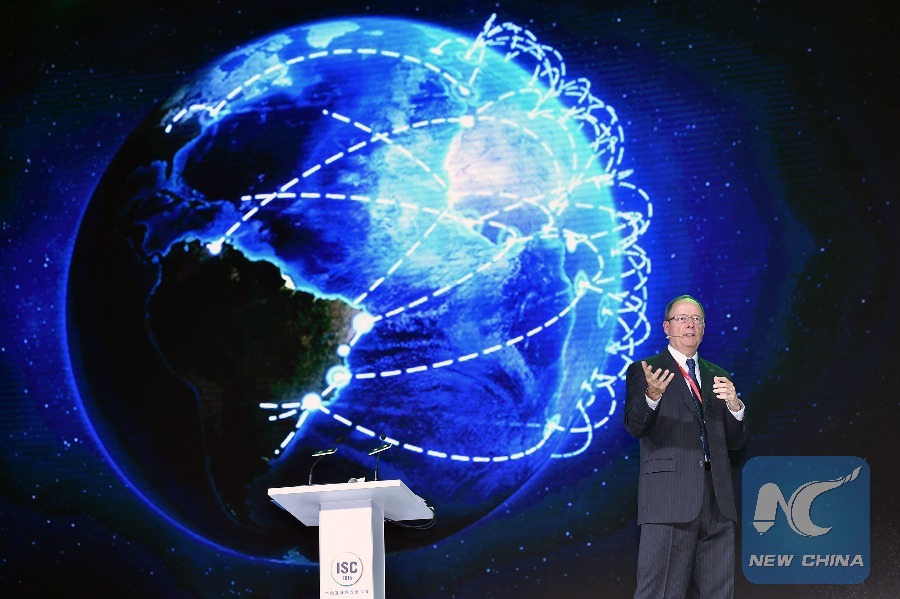
Keith B. Alexander, first commander of the U.S. Cyber Command and former chief of the National Security Agency, speaks during the 2015 China Internet Security Conference in Beijing, capital of China, Sept. 29, 2015. A total of 120 experts from China, U.S., Israel, Australia, South Korea, etc. took part in the two-day conference that kicked off here Tuesday. (Xinhua/Li Xin)
BEIJING, April 20 (Xinhua) -- China's rapid and healthy development of the Internet and information industries has brought a host of tangible benefits to its people.
China got access to the Internet in 1994. Since then, China has achieved a great leap in developing its Internet and information industries.
By December 2017, the number of Chinese netizens reached 772 million, of which 753 million surf the Internet via mobile phones, according to statistics released by China Internet Network Information Center.
Overseas experts acknowledge that China's fast Internet development has also promoted the development of the global Internet industry with advanced hardware and technical innovation.

File photo taken on Dec. 3, 2017 shows Xu Zhijun, Huawei's rotating CEO, introduces achievements of 5G technology during the release ceremony for world leading Internet scientific and technological achievements in Wuzhen, east China's Zhejiang Province. (Xinhua/Zheng Huansong)
"China plays a huge role in technology and innovation. So I think in an ideal world, countries like China will participate in the development of solutions," Sally Wentworth, vice president of global policy for the Internet Society (ISOC), told Xinhua in a recent interview.
"Our extensive research clearly shows that just as when the Internet Society was founded 25 years ago, people believe that the Internet's core values still remain valid -- that it must be global, open, secure, and used for the benefit of people everywhere in the world," Wentworth said.
Thanks to China's rapid Internet development, China has done a great job in promoting online financing, industrial upgrading and the combination of the Internet and mobile communications, said Guo Yike, head of Data Science Institute of Imperial College London.
Experts pointed out that China has the ability to help deal with cyber security threats around the world with advanced hardware.

People visit the Light of Internet Exposition of the fourth World Internet Conference in Wuzhen of Tongxiang City of east China's Zhejiang Province, Dec. 2, 2017. The expo, attracting 411 renowned internet enterprises from home and abroad, showcases the latest internet technologies and applications from around the world, highlighting artificial intelligence, cloud computing, big data and other areas. (Xinhua/Li Xin)
The Internet is a brilliant invention, but it "cannot be an area where illegality is allowed to simply exist in a way that it wouldn't be in the real world," said Robert Hannigan, former director of Britain's Government Communications Headquarters (GCHQ).
"Much computer software around the world is designed and manufactured in China. Thus China has been in a good position to assist the world to cope with cybersecurity threats. Because only through improving the security standards for both hardware and software can we build a safer cyber world," Hannigan said.
Commenting on Chinese President Xi Jinping's call for respecting Internet sovereignty and building a community of shared future in cyberspace, Guo said both notions are very precise.
"Of course the Internet bears the characteristics of sovereignty," Guo said. "Although the Internet connects every part of the world, data itself is a huge resource, and where there are resources, there is sovereignty. There's no doubt about that."

File photo taken on May 25, 2017 shows a demonstration center of Guizhou big data pilot zone in Guiyang, southwest China's Guizhou Province. (Xinhua/Liu Xu)
On the one hand, Guo said, sovereign rights over the Internet -- especially those concerning information resources -- should be respected, while on the other hand, further efforts should be made to build a smoothly interconnected world, thanks to which science and technology have already been developing by leaps and bounds.
"On top of protecting our information resources and Internet sovereignty, we should make more efforts to enrich this concept of a community of shared future in cyberspace," said Guo.
Guo has been paying close attention to China's Internet Plus strategy. He said there is "a large portion (within that strategy) where China has done extremely well."
First proposed in 2015, the Internet Plus -- sometimes likened to the "information highway" championed by former U.S. President Bill Clinton in the 1990s -- refers to the application of the Internet and other information technology in conventional industries that have previously been operating offline.
Chinese Premier Li Keqiang said in his 2015 Government Work Report that an action plan for the strategy aims to integrate mobile Internet, cloud computing, big data and the Internet of Things with modern manufacturing, to encourage the healthy development of e-commerce, industrial networks, and Internet banking, and to help Internet companies increase their international presence.
"I think China's development in recent years has truly led the world in revolutionizing the business sector by adopting the next generation Internet technologies," Guo said.

